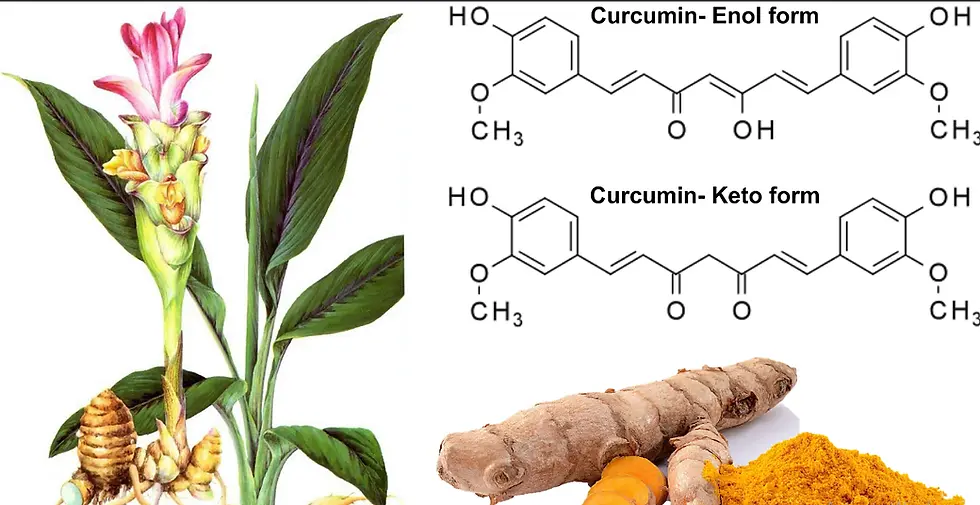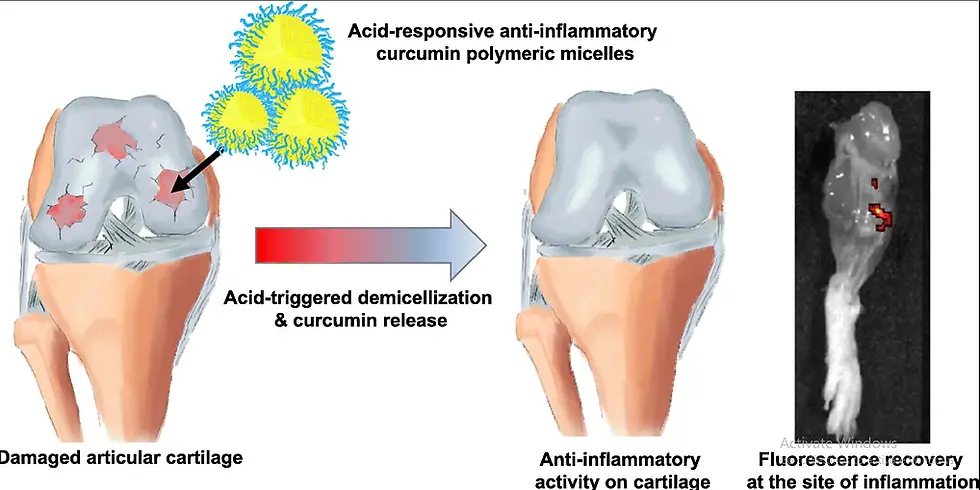Curcumin and Arthritis
- Sharad Jaiswal
- Jul 15, 2024
- 7 min read
Curcumin
Curcumin is from the family of substances known as curcuminoid, which has anti-inflammatory and antioxidant characteristics.
Turmeric, a spice frequently used in Indian food, contains the natural substance curcumin.
The polyphenolic substance that gives the spice its unique color and has been linked to a host of health advantages is to blame.
Numerous health effects, including anti-inflammatory, anti-cancer, and neuroprotective qualities, have been discovered.
Enzymes, transcription factors, and cell signaling molecules are just a few of the numerous molecular targets it might interact with within the body.
Due to its adaptability, curcumin can have a variety of biological effects, making it a highly intriguing drug candidate.
The second is curcumin's positive effects on health. Curcumin has been found to potentially improve many health conditions, including inflammation, cognitive function, and heart health [1].
Numerous chronic diseases, such as diabetes, cancer, and heart disease, are significantly influenced by chronic inflammation.
It has been discovered to increase the production of BDNF, a protein necessary for the development and survival of neurons.
The action of various pro-inflammatory molecules is inhibited by curcumin, which lowers inflammation throughout the body.
Furthermore, curcumin has been demonstrated to have neuroprotective properties that may aid in delaying or reducing cognitive deterioration.
Because low levels of BDNF have been linked to several neurological diseases, including depression and Alzheimer's disease, this discovery is quite significant.
Curcumin has been demonstrated in studies to offer several benefits for heart health. It has been associated with decreased blood pressure, improved endothelial function, and an overall decreased risk of cardiovascular disease.
The anti-inflammatory property of curcumin, which assists in lessening the inflammation linked to heart disease, may be partially responsible for these advantages. This property of curcumin also makes it significant in the treatment of many disorders including Arthritis [2].
Curcumin is a very promising natural substance that might provide a variety of health advantages. Due to its distinctive chemical structure, it can interact with a variety of biological targets and potentially produce a wide range of advantageous effects.

Arthritis
It is an inflammatory disorder of joints that can cause stiffness of joints as well as pain.
More than 100 different types of this disorder have been reported and all of them can cause severe pain in joints. The most common of these 100 types are:
Osteoarthritis
Rheumatoid arthritis
The risk of this disorder can be increased based on different factors such as:
Age
Some joint problems
Obesity
Infections
Family history
Major symptoms associated with this disorder include joint pain, stiffness, and difficulty in mobility. If the disease becomes severe, then it may cause disability as well.
It can be diagnosed with imaging tests as well as by blood tests.
After diagnosis, it can be cured by changing the lifestyle, such as by reducing body weight and improving diet [3].
But in severe cases proper treatment of the disease is needed as it becomes difficult for the patient to survive with such pain and joint problems.
Different Types of Arthritis
More than 100 different types of this disorder have been reported. All of these are linked to joint problems. Some of the most common types of arthritis are as follows:
Osteoarthritis
It is the most common type of arthritis. It results when the cartilage of joints is broken due to some stress.
Gout
It is another form of arthritis disorder that occurs as a result of the formation and accumulation of crystals of uric acid in the joint. It can result in pain and inflammation of the joint.
Rheumatoid Arthritis
This is the second most frequent type of this disorder. It is actually an autoimmune disorder that happens when the body’s immune system attacks the synovial membrane thinking of it as foreign material and resulting in the breakage of this membrane in joints. It can cause severe joint pain as well as inflammation.
Juvenile Arthritis
This is a type of arthritis that usually attacks children aged 16 years or even less. It is also an autoimmune disease that occurs when the immune system detects the tissues around the joint and attacks them, resulting in tissue rupture and inflammation of that joint [4].

Available Therapeutic Modalities for Arthritis
As mentioned above, arthritis is a common disorder of joints, and research has suggested that most women are affected by this disease throughout the world.
The risk of the disorder increases with age in women and also lifestyle matters in most cases.
Different medicinal strategies are available to cure the disease. Some of the common methods used for treatment include:
Physical Exercise
Exercise also acts as a therapy in most cases and is recommended to patients in order to enhance their joint mobility and reduce the pain caused by this disease. [5]
Medications
Different medicines are available that are recommended by physicians to their patients in order to reduce the inflammation and pain caused by this disorder in joints. In some cases of autoimmune diseases, as mentioned above in the types of arthritis, physicians also recommend special medicines called biologics to their patients that normalize the immune system of their bodies.
Arthritis Injections
In most cases, the specific type of injections is also given to patients if they are suffering from severe pain and inflammation. It can help them reduce the symptoms of arthritis disorder.
Surgery
If the arthritis disorder becomes chronic, then in those cases, surgery is performed to cure the disease. During surgery, either the damaged joint is replaced by some artificial joint or two bones are permanently joined together to increase mobility [6].
Role of Curcumin in Treating the Arthritis
Curcumin is a crucial compound with many important properties. One of the major characteristics of this compound is its anti-inflammatory properties.
It has been found through scientific evidence that curcumin plays many important roles that can have significant results in the treatment of arthritis.
Research studies have shown that this crucial compound, curcumin, acts through a number of different processes and helps alleviate the symptoms of arthritis and treat this disorder completely. Moreover, it has also been found that this compound has no side effects and is safe for humans [7].
Mechanisms of Action of Curcumin in Treating Arthritis
Following processes have been found through the literature that shows that curcumin can have positive outcomes in the treatment of arthritis.
Anti-inflammatory Action of Curcumin
Many experiments have shown that curcumin plays a fundamental role in reducing the inflammation of joints caused by arthritis. It can act in multiple ways in order to decrease inflammation.
Curcumin can inhibit the pathways in cells that are required for the production of different inflammatory substances and can lead to inflammation in joints. One such pathway is NFK-B which is inhibited by curcumin.
Curcumin also inhibits several enzymes which are involved in stimulating the production of inflammatory substances such as prostaglandins which can lead to swelling as well as pain in joints [8].
So, by inhibiting the pro-inflammatory substances in cells, and activating the production of anti-inflammatory substances, curcumin can help reduce inflammation in arthritis patients.
Regulation of the Immune System
Studies have also shown that curcumin plays a very crucial role in modulating the activities of the immune system.
Arthritis is caused by dysregulation of the immune system, and this can be cured using curcumin due to its property of immunomodulation.
Curcumin stops the production of immune cells that are involved in the causation of inflammation. So, when these cells are not produced, they will not be brought to the site the immune system is affecting, and no inflammation will occur.
Antioxidant Effects of Curcumin
It has also been found that curcumin processes in reducing the oxidative stress in cells which is also an important factor in arthritis. When ROS is not neutralized, it can cause inflammation in the joint.
So, curcumin plays a role in stimulating the enzymes which play roles in the neutralization of oxidative stress in the cell.
This will ultimately help in the treatment of arthritis by alleviating symptoms such as pain and inflammation [9].
Protection of the Cartilage
In some types of arthritis, the cartilage of the joint is damaged which leads to severe pain and inflammation.
It has been shown by a few studies that curcumin has the characteristic of protecting the cartilage in the joints so that it is not damaged and thus such arthritis disorders are prevented.

Preclinical and Clinical Trials Data
Studies have been performed on animal models as well as on humans to check the safety and efficacy of curcumin in the treatment of different types of arthritis.
All the studies have shown significant results of curcumin in reducing pain as well as inflammation of joints.
Experiments performed on animal models have shown that curcumin can reduce inflammation in the joints of animals caused by arthritis. It can do so by inhibiting the production of inflammatory substances in cells and stimulating the synthesis of anti-inflammatory substances. Curcumin can also inhibit various signaling pathways which can lead to inflammation.
Similarly, studies have also been done on human patients with different types of arthritis disorders. So, the safety of curcumin can also be studied along with its mechanism.
Six studies were performed comprising 417 patients. All have osteoarthritis disease. They were randomly given either placebo or curcumin. Results were compared in both groups, and it was seen that the patients treated with curcumin have significant results as compared to the patients who were given a placebo as a control. Those treated with curcumin have alleviation of all the symptoms including pain and inflammation [10].
Another study also showed the results of 9 trials that comprised around 670 patients. They also have OA disorder. These were randomly divided into two groups; one group was given a placebo control while the second one was treated with curcumin for a specific time period. It was seen that curcumin helped the patients in curing all the symptoms of OA and make their survival even better.
A clinical study was performed on patients with Rheumatoid arthritis disease. It comprised around 45 patients who were randomly divided into two groups and were given either a placebo or curcumin for two months. Significant outcomes were seen in patients who were given curcumin as compared to those given a placebo. Moreover, curcumin also reduced the chances of recurrence of the disorder in these patients.
A study was also performed in which the effectiveness of curcumin was compared with the already available drug for arthritis. It involved patients with OA. They were randomly given either curcumin, NSAID, or a placebo. It was seen that curcumin was as effective as an already available drug. Icing on the cake, curcumin showed negligible side effects as compared to NSAIDs [11].
So, from the above data, we can easily conclude that curcumin is a promising therapy for treating almost all types of arthritis. It has no side effects in human patients.




Comments